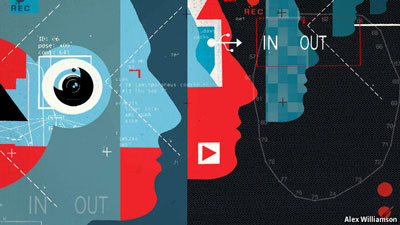In this digital day and age, not only smartphones and consumer cameras are booming. Surveillance is big business. As cameras become ubiquitous and able to identify people, more safeguards on privacy will be needed. It is getting ever easier to record anything, or everything, that you see. This opens fascinating possibilities — and alarming ones. The Economist explores:
Thanks to digital technology the world is replete with cheap and highly capable cameras. ABI, a research firm, reckons there were a billion built into the mobile phones and tablets shipped in 2012 (many boast more than one). Add CCTV. Together, these cameras record about anything happening on planet earth.

Glass cannot analyse its wearers’ world, or its wearers, anything like this well yet, and many companies patent ideas without planning to make use of them. But it is hardly paranoid to think that a company which says its mission is “to organise the world’s information and make it universally accessible and useful” might be interested in looking over its users’ shoulders, if it can find a way to do so that they will think helpful and not find intrusive.
If it could do so usefully and acceptably enough, Google could help users interrogate their own histories in much the same way as they now search for weather forecasts and celebrity news. And with cameras increasingly getting wired and — think NSA — any information being potentially hackable, we become “transparent” citizens for all to see.
Privacy is no longer a “social norm”, as Mark Zuckerberg claims, founder of Facebook. Our cameras make us more transparent, less unknown and maybe more predictable. It’s upon each and one of us to decide where his or her privacy starts and ends. As selfie is probably not only the most overused word in 2013, but also the most overused action, it’s obvious that most people don’t give a damn about their own privacy.
In this spirit, a happy, strong and inspiring 2014 to everyone!
Read the whole article “Ubiquitous Cameras — The People’s Panopticon” on The Economist.


